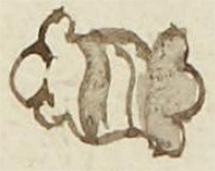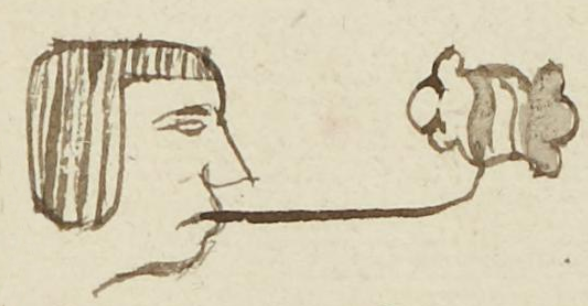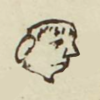de Gante (MH855r)
This black-line drawing of the simplex glyph for the personal name de Gante is attested here as a man's name. The glyph is of a stone (tetl), providing the phonetic start to the name ("te" for "de"). The "Gante" part of the name is not shown visually. The stone is horizontal, and it is a typical rendition with its curly ends and alternating light and dark stripes at a diagonal. One end is lighter and one end is darker.
Stephanie Wood
This man is somewhat unusual in having a Spanish surname, but it was a famous name. Pedro de Gante (c. 1480–1572), was probably present in New Spain when Baltazar de Gante was born, as this Flemish immigrant arrived there ahead of Los Doce (The Twelve) Franciscans, famed as the first missionaries. Pedro de Gante established a school in Mexico City, learned Nahuatl, and published a Christian doctrine in the language, which could explain his popularity with Nahuas, similar to Toribio de Benavente Motolinía. A great many Nahuas took the name Toribio (as a quick search of the name will attest), and at least three had the name Motolinia.
Stephanie Wood
bartasal decante.
Baltazar De Gante
Stephanie Wood
1560
Jeff Haskett-Wood
préstamos, piedras, nombres de frailes, nombres de hombres, nombres españoles, nombres prestados

Gante, the name of one of the earliest friars in New Spain, https://nahuatl.wired-humanities.org/content/gante
de, of, from (a loanword from Spanish), https://nahuatl.wired-humanities.org/content/de
te(tl), stone, https://nahuatl.wired-humanities.org/content/tetl-0
de Gante
Matrícula de Huexotzinco, folio 855r, World Digital Library, https://www.loc.gov/resource/gdcwdl.wdl_15282/?sp=782&st=image
This manuscript is hosted by the Library of Congress and the World Digital Library; used here with the Creative Commons, “Attribution-NonCommercial-ShareAlike 3.0 License” (CC-BY-NC-SAq 3.0).











